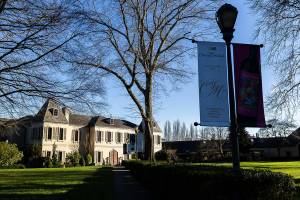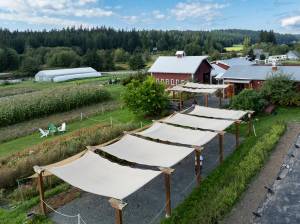‘Passing on what’s important’
Published 8:52 pm Friday, September 21, 2007
One of the things I’ve always liked about Everett is the thin line between its social classes.
The guy in a hockey jersey sitting next to you at an Everett Silvertips game could be a millionaire. Ditto for the person next door. In either case, you likely wouldn’t know it.
For the three decades that I’ve been here, it’s been part of Everett’s culture that the successful families usually aren’t showy about their wealth and don’t seek out gated communities so they don’t have to hobnob with those with less loot.
I trace that back to the city’s roots, when the waterfront was crammed with mills and all the employees lived a short walk away. To this day, you can drive through north Everett and see the former homes of mill owners and managers next door to the former homes of mill workers. The managers’ homes were a lot bigger and nicer, but they’re all in the same neighborhood.
Everett’s more well-to-do families are also a huge part of the community. They open their checkbooks to aid nonprofit organizations or to build a new hospital or even to help bring in a new sports team.
And it isn’t just their checkbooks. Many of what you might call the city’s supporting families have no problem rolling up their sleeves and doing real work on a project.
One of my favorite examples of this relates to the late Bob Long, the owner of the Judd &Black appliance chain now run by his sons. Long was probably the community member most responsible for bringing today’s AquaSox minor league baseball team to Everett, which was then called the Giants. Not only did he personally buy four billboard ads and 10 season tickets, but he improved the high school ball diamond with a replica of the scoreboard once at Ebbets Field, home of the Brooklyn Dodgers.
Long could have paid a company to do the work. But he built the scoreboard himself in pieces in his garage. Then he rigged a pulley system and helped owner Bob Bavasi knit it all together like a puzzle.
“Nobody needs four billboards and 10 season tickets,” Bavasi said after Long’s passing in 2004. “But he did it to ensure we got going on our way.”
This is a terribly rambling lead-in to a recent chat I had with Nancy Stuchell Kniest, who this summer was named president of Stuchell Enterprises.
The Stuchells are another one of those supporting families that aren’t real keen about promoting themselves or their good works. I’m told by others that they’re toward the top of that supporter list, a family that gives money from its own foundation and has individual members who write their own checks and also give their time to projects.
Kniest is co-chair of a $2.7 million fundraising campaign for Camp Fire, an organization her family has supported for four generations. Most of the money will go to expansion and paying off the debts of Camp Killoqua, a facility in Snohomish County used by 65 other nonprofit groups to provide a bunch of summer camps, including a grief camp for young people who’ve lost loved ones.
Dave Surface, executive director of the county branch of Camp Fire, noted that Kniest’s grandmother helped secure the 60-acre site for the camp in 1941. It’s now up to 185 acres.
That’s a big camp. But it doesn’t have enough facilities.
“In the middle of June, it was all booked up,” Kniest said. “We had to turn people away.”
Kniest, a former Camp Fire girl, said she supports the organization because she knows it helps young people have fun and grow into confident adults. She and her husband, Paul, have two girls in Camp Fire. Paul leads their group.
While I was interested in the campaign, I also enjoyed talking to Kniest about what it’s like to belong to the fourth generation of an Everett founding family that has its own charitable foundation and a diverse business enterprise that includes things like ownership of the waterfront buildings that house Lombardi’s restaurant and U.S. Marine.
Kniest explained that the family resources started with a shingle mill opened by her great-grandfather in 1904 and continued with mills in a variety of places operated until 1994. One of Everett’s biggest fires, she noted, came in 1963 when the family’s Eclipse lumber mill burned to the ground.
The organization Kniest is president of now, Stuchell Enterprises, was launched in 1989 by her father, Harry. “Our goal right now is to provide opportunities for the current generation and to provide investments that future generations will benefit from,” she said of the business side of the family. “Hopefully, we’ll keep the Stuchell family around for a long time to come.”
Nancy said she has a responsibility to a big family that includes 19 nieces and nephews.
“You learn to be a diplomat and you learn to juggle it all,” she said.
Every year, the family goes away for a meeting to talk business and for events designed to bring the group together. The foundation, she noted, is led by her mother, Carol, and has given to 20 organizations or so through the years. “Everybody has their favorites,” she said of which groups the foundation should help. “We usually adhere to what mom and dad like.”
Most of the money, she noted, goes to Snohomish County organizations, like Camp Fire.
The Stuchell’s have meant a lot to Camp Fire and it appreciates the family’s continued help. “They’re passing on what’s important from one generation to another,” said Toby Brown, coordinator of the fundraising campaign.
Brown noted the family has made a big difference for not just Camp Fire, but for the community. “They’re real people staying in the community and being part of it,” she said.
It’s nice to see that a good part of Everett’s character is being kept alive.
Mike Benbow: 425-339-3459; benbow@heraldnet.com




